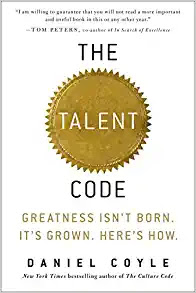Some books are designed to get a reader thinking. This book couldn't help but grab my mind to think of possibilities and applications.
Daniel Coyle's The Talent Code is a book I've meant to read for the longest time. Ever since stumbling upon his other work, The Culture Code, I couldn't help but notice how many other authors mentioned this specific title from among the books he's written.
The Talent Code delves into what—at least to me—is a fascinating world: of how the brain works, of memory, of learning, of aptitude, of talent. One thing this book is not: it is definitely not about genius as a native state, only a skill developed by deep learning. I find the ideas and discoveries about that knack of learning which fascinate me.
It all comes down to what neurologists call myelin, and a concept Coyle repeats, like a mantra, throughout the 267 pages of the updated version of his 2009 book: "Skill is a cellular insulation that wraps neural circuits and that grows in response to certain signals." It's those signals I want to learn more about, learn how to apply to my own projects and, to some extent, the rest of my life.
The cellular insulation Coyle speaks of is myelin, the essence which wraps itself in protection around nerve messaging pathways as we learn and develop skills. It's not just for Einsteins or child prodigies, or even soccer players or violin virtuousos—though he does examine such examples from what he calls "hotbeds" of talent around the world.
The book leads the reader through a tour of scientific discoveries in layman terms, outlaying the factors that help us learn—and remember—any number of skills. The tour touches on—and, in some cases, debunks—a wide variety of concepts, from "nature versus nurture" to the "ten thousand hours" of practice, to why poverty-stricken inner city centers in Brazil or Russia, for example, turn out world-class athletes.
My aspirations, of course, are not so lofty. No matter how much myelin I might manage to lay down on the right neural pathways, I will never be a tennis champ. But I can perfect my investigative skills and hone in on more effective research approaches—my prime motivation for reading this book. Since I'm already fascinated with the fields of psychology and education, I can't help but see what discoveries mentioned in the book can cross-apply to my own business projects. There is certainly much to be considered in the worlds Daniel Coyle explores for readers of The Talent Code.

No comments:
Post a Comment